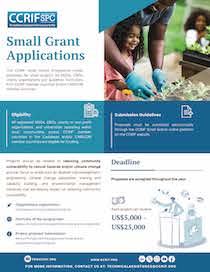August 19, 2009 - The small island developing states that constitute the Caribbean region are prone to the two main global catastrophe hazards, earthquakes and hurricanes. These hazards which often lead to natural disasters in this region have had dire consequences for economic activities, infrastructure, human welfare and natural resource management.
To a large extent, many of these disasters result from the failures of development policy to mitigate vulnerability to hazard events. Climate change, considered as the most pervasive and truly global of all issues affecting humanity, is likely to increase the incidence of natural disasters by causing extreme weather events to be more intense and to occur more frequently.
With this in mind, the Caribbean Catastrophe Risk Insurance Facility (CCRIF) and the Caribbean Disaster Emergency Response Agency (CDERA) signed a Memorandum of Understanding (MOU) formalising a partnership to facilitate capacity building and to develop strategies for mitigating the physical and socio-economic impacts of natural disasters, such as hurricanes and earthquakes, on countries in the region.
The signing took place on Wednesday, August 19, 2009 at the offices of the Caribbean Development Bank in Bridgetown, Barbados. Mr. Milo Pearson, Chairman of CCRIF signed on behalf of the Caribbean Catastrophe Risk Insurance Facility while Mr. Jeremy Collymore, Coordinator, CDERA signed for the Caribbean Disaster Emergency Response Agency.
The objectives of the MOU are to promote the use of catastrophe risk modelling tools, to introduce new products and initiatives to assist Caribbean governments in better understanding and financing catastrophe risk exposures and to share information on real time hazard and impact information.
In his remarks, Mr. Pearson said that the CCRIF’s participation in this partnership will enable the governments in the region to access financial resources in a timely manner to jumpstart their countries’ economic recovery in the aftermath of a major catastrophe disaster. In the past two years, the CCRIF paid out approximately US$500,000 each to Dominica and St. Lucia after an earthquake occurred in 2007, and US$6.3M to the Turks and Caicos Islands in the aftermath of Hurricane Ike. The CCRIF continues to work on developing new products, such as an extreme rainfall coverage, that will benefit countries throughout the region.
Mr. Collymore added that the Memorandum of Understanding strengthens CDERA’s ability to implement the Hyogo Framework for Action that aims to reduce countries’ vulnerability to natural hazards. He noted: “the MOU represents the launching of a platform to minimise the hemorrhaging of regional assets, particularly in relation to hydrometeorological hazards.”
Nineteen Caribbean governments will benefit from this MOU: Anguilla, Antigua & Barbuda, Bahamas, Barbados, Belize, Dominica, Grenada, Jamaica, St. Kitts & Nevis, St. Lucia, St. Vincent & the Grenadines, Trinidad & Tobago and the Turks and Caicos Islands who are current members of both the CCRIF and CDERA, as well as CCRIF members, Bermuda, Cayman Islands, and Haiti and CDERA members the British Virgin Islands, Guyana, and Montserrat.
 Dr. Warren Smith, Director of Finance and Corporate Planning at the CDB and Board member of the CCRIF, looks on as Mr. Jeremy Collymore, Coordinator of CDERA and Mr. Milo Pearson, Chairman of the CCRIF shake hands on the signing of the MOU between their two agencies.
Dr. Warren Smith, Director of Finance and Corporate Planning at the CDB and Board member of the CCRIF, looks on as Mr. Jeremy Collymore, Coordinator of CDERA and Mr. Milo Pearson, Chairman of the CCRIF shake hands on the signing of the MOU between their two agencies.
About CCRIF: The CCRIF is a risk pooling facility, owned, operated and registered in the Caribbean for Caribbean governments. It is designed to limit the financial impact of catastrophic hurricanes and earthquakes to Caribbean governments by quickly providing short term liquidity when a policy is triggered. It is the world’s first regional fund utilising parametric insurance, giving Caribbean governments the unique opportunity to purchase earthquake and hurricane catastrophe coverage with lowest-possible pricing. The CCRIF represents a paradigm shift in the way governments treat risk, with Caribbean governments leading the way in pre-disaster planning.
About CDERA: The Caribbean Disaster Emergency Response Agency is a disaster management organisation which serves the Caribbean Community (CARICOM). The organisation facilitates the dissemination of comprehensive and reliable information on disasters affecting the region; mitigates the consequences of disasters; establishes adequate disaster response capabilities among participating states; and mobilises and coordinates disaster relief from governmental and non-governmental organisations in member states.
For more information, contact:
CCRIF: Dr. Simon Young or Ms. Ekosuehi Iyahen at 246 426 1525, e-mail syoung@ccrif.org / eiyahen@ccrif.org
CDERA: Keisha Atwell or Zadie Neufville at 246-425-0386, e-mail zadie.neufville@cdera.org
Or see the CCRIF website at www.ccrif.org or the CDERA website at www.cdera.org





